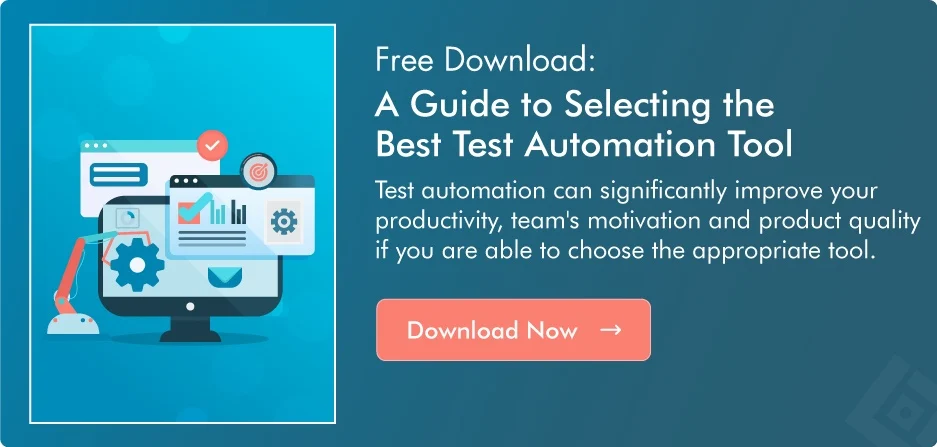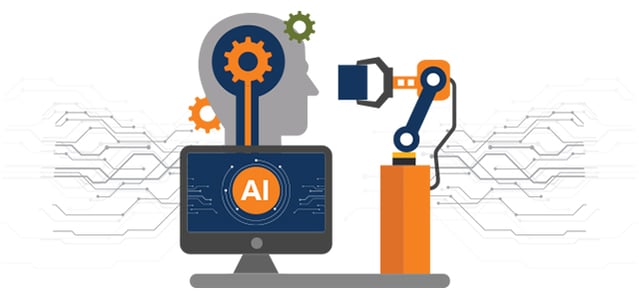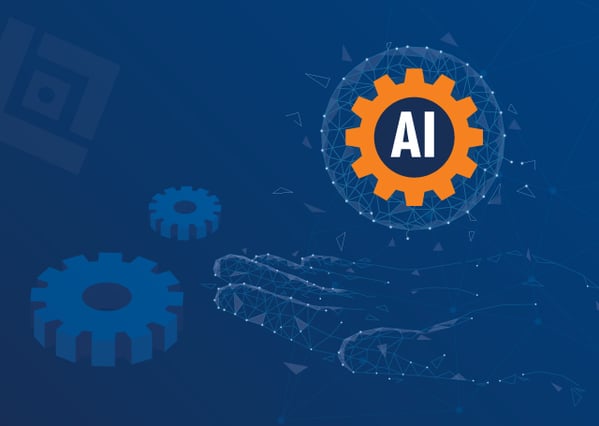
The use of AI in software testing is geared towards making the software development lifecycle easier. Through the application of reasoning, problem solving and machine learning, artificial intelligence can be used to reduce the tedious and manual aspects of software development and testing, and automate the whole process.
What Is Automation Testing?
Automation testing is the software testing process of running test cases by using automated testing tools. With this type of testing, QA teams can perform tests faster, receive more accurate results and address code defects sooner.
What is AI?
AI is designed to take automation testing up a notch. AI—formally known as artificial intelligence—is the computer science approach to building smart machines that are capable of performing tasks previously requiring human intelligence to execute.
Imagine the power you can create within your testing strategy by combining AI and test automation together!
In this comprehensive guide, we answer your most pressing questions about AI automation, including:
- What is the role of AI in software testing?
- What are the advantages of AI and automation testing?
- How do you use AI in testing with automation?
- What are the best AI testing tools that drive automation?
The Advantages of AI in Automation Testing
Even though artificial intelligence in the QA process is a fairly new concept, AI testing is already impacting automation testing for the better. Given the results it delivers, the role of AI in software testing proves to be more pertinent than ever. Here’s how AI test automation adds value to your testing strategy.
- Faster and More Stable UI Tests: Many UI test cases are slow to run and require high maintenance. AI automation combats this challenge with Dynamic Locators, a strategy that parses multiple attributes of each element that the user interacts with to create a list of location strategies in real time. These tests are designed to be fail-proof, even if an attribute of an element changes. This tactic makes AI test cases more stable, resulting in faster testing (especially when using these UI automation testing tools).
- Constant Learning from Data Production: All teams want insight on how consumers use their application. AI and test automation can now work together to do just that. AI can observe how the end users navigate the product and identify common user behaviors. It then creates AI test cases and reusable components based on real user data.
- Eliminating Dependencies: One of the biggest challenges in test automation is writing tests for a system with dependencies on other modules both implemented and not implemented. To combat this, QA engineers mock responses from a database or a server. That’s not the case with AI. Instead, AI automation can record server responses during testing over time so that future testing can rely on stored responses, which speeds up the testing process.
- Minimize Maintenance and Eliminate Flaky Tests: So much time is needed to maintain automated test scripts. For example, whenever a test fails, we have to first manually review the test automation to see whether the issue lies within the test case itself. When AI and automation testing work together, maintenance is as fluid as the QA process. AI can detect issues within the test scripts and adjust the test cases before they’re performed. This proactive approach to fixing tests saves time in making sure everything is stable.
- Ease of Test Execution: There are still QA teams who have not adopted automation because of the time and effort it takes to create and perform automated tests, especially when resources are limited. AI automation is designed to mitigate this obstacle because artificial intelligence can create complex test cases within hours. While QA testers rely only on brainpower and knowledge of the product, AI in testing applies the use of Dynamic Locators and its ability to create reusable components for executing data-driven tests, developing effective test automation quickly and integrating CI/CD systems seamlessly with both private and public grids. This result in reliable testing, less maintenance, more test coverage and faster production deployments.
- Release Products Faster: The role of AI in software testing is to expedite the automated testing process so that manual testers can focus on human-driven testing. Because of AI and test automation, QA teams can focus more on exploratory testing and supporting developers on resolving defects. AI automation works in parallel with your QA team, which reduces testing time and identifies issues sooner so that you can release products faster.
How to Use AI in Automation Testing
It’s easy to see why so many QA teams choose to pair AI and automation testing within their QA strategy. Yet, the only way AI automation brings value to your release cycle is when it is implemented smartly within the QA practices. We at QASource recommend adopting the following best practices so that AI-driven test automation enhances your testing procedures.
- Run Visual, Automated UI Tests: Unlike standard test automation, AI testing can run image-based tests by using automated visual validation tools. You can use artificial intelligence to verify that your application’s UI appears correctly to users without relying on manual testing. AI is able to evaluate each UI element, from colors and shapes to position and size. Moreover, with the assistance of visual validation tools, AI can catch discrepancies often missed by human testers.
- Run More Meaningful Automated Tests: Small, untraceable changes in your codebase can lead to running your entire test suite. That’s not the case with AI—instead, AI tools can assess your updated code and recommend the number of test cases to run. AI can analyze your current test coverage, flagging areas that don’t need to be addressed and emphasizing application areas that are at risk.
- Test Your APIs: A lot of attention is dedicated to testing a product’s back-end simply because of the amount of activity that happens behind the figurative curtain. During API testing, AI can digest the analytics behind your API calls to assess product behaviors and notice issues between third-party integrations in real time.
- Spidering AI: A key strength of artificial intelligence is its ability to automatically write tests. AI makes this happen through spidering, that is, it crawls through your application, measuring load times and collecting feature data through screenshots and HTML downloads. From one development cycle to the next, AI understands expected product patterns and identifies any deviations. QA testers can then validate the identified discrepancies and strategize the next steps.
- Create Automated Tests That are Reliable: Something as small as changing a field name can make test cases fail. You can train your AI testing tools to learn your software system so that it understands the relationships between the parts of the document object model. Knowing how your application can change over time means that AI can identify which locators should be used as elements during testing.
5 Popular AI-Powered Test Automation Tools
Simply put, you can’t do AI testing without AI testing tools. Identifying the right software tools you need for AI testing comes down to knowing how your team functions and what you want to get out of AI-driven testing. When researching your options, we recommend reviewing these AI-powered test automation tools.
- TestCraft: This AI test automation platform is ideal for continuous and regression testing. By working on top of Selenium, testers can visually create automated, Selenium-based test cases through a drag-and-drop dashboard, even without having any coding skills. . TestCraft allows teams to run testing across multiple browsers and work environments concurrently
- Applitools: As a visual UI testing and monitoring tool, Applitools excels at application visual management. Powered by Visual AI, this testing platform can be used across skill levels to assess visual elements within your UI. It's entirely adaptive approach means it scans every screen within your app, then analyzes any notable discrepancies.
- Functionize: This AI testing tool is designed for automating performance, load and functional testing. Functionize speeds up test creation, diagnosis and maintenance by executing thousands of test cases in minutes across all devices and browsers. This platform can also create functional test cases based on plain English requests.
- Sauce Labs: As a cloud-based test automation tool, Sauce Labs leverages AI to perform automated testing across an impressive list of browsers, OS and mobile emulators. This testing tool claims to be the largest continuous testing cloud on the market, making it ideal for validating application performance across all web-based platforms.
- Testim: This automated function test tool uses AI so that authoring, performing and maintaining automated tests happens faster. Testim runs across platforms and browsers including Chrome, Edge, Firefox, Safari, IE and Android.
Enjoy the benefits of AI automation within your testing strategy by partnering with a reliable QA services provider like QASource. Our team of testing experts have years of experience across a variety of QA services including AI testing and automation testing. With QASource, you can increase your scalability and test case accuracy while achieving rapid efficiency in your testing procedures. Get a free quote today.




